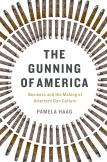Is the American gun industry an amoral enterprise?
The American gun industry has succeeded in wiping its fingerprints off any firearms employed in incidents of gun violence. Media reports ignore what, if any, responsibility gun manufacturers have for the tragedies inflicted by their deadly products. When the families of those slain try to hold the industry to account in court for making combat-style weapons available to the public, the plaintiffs find themselves looking down the barrel of the Protection of Lawful Commerce in Arms Act, which provides broad immunity for manufacturers and sellers of guns used in crimes. That is what the dismayed parents of the murdered children in Newtown, Conn., found when a state judge dismissed their suit against the Remington Outdoor Company, whose AR-15-style rifle was the killer’s weapon of choice.
The Gunning of America points the problem of violence back on the gun industry. In her fascinating history of the origin and growth of American gun culture, Pamela Haag draws back the curtain that has rendered manufacturers invisible. She finds that “American gun violence emerged from the banality of the American gun business." With the advent of mass manufacturing in the 19th century, the public had to be seduced to buy guns so that gun factories could fully utilize capacity and maximize profits. Marketers had to convince the public that everyone needed a gun. A mystique was born: “Real men" needed to own guns; women were unsafe without one; municipal governments needed them even more than they thought. In Haag’s eye-opening account, the gun industry unfolds as a fundamentally amoral enterprise. Conscience plays no role in its decisions; manufacturers accept no responsibility, even indirectly, for the violent consequences of their work. It’s just business, after all.
This article also appeared in print, under the headline “Is the American gun industry an amoral enterprise?,” in the June 12, 2017, issue.









